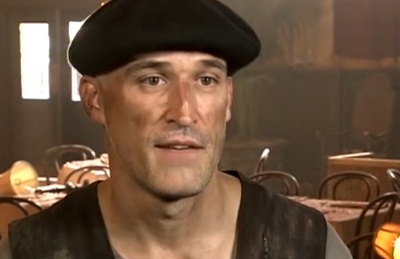basque heritage worldwide

07/11/2012

ADVERTISING
San Francisco, US. Last May the movie Hemingway and Gelhorn debuted on HBO with the story of the relationship between writer Ernest Hemingway and war correspondent Marta Gelhorn. The film stars Clive Owen and Nicole Kidman, and along with them in a small roll is Aitor Inarra, portraying a Basque named Leon Felipe (video here). Aitor is well known in the Basque community in San Francisco and is originally from Donostia.
He teaches Basque at the Cultural Center and that is this was his first opportunity in the world of film. It all happened by coincidence. “The president of the SFBCC sent me an email that they were looking for a Basque actor, including a photo, and it was true the person in the photo could have been me. They usually tell me that I have a very Basque face,” Inarra told EuskalKultura.com. “I responded on Wednesday, and on Thursday they called me from casting and I met Clive Owen, and on Friday we started filming with Nicole Kidman.”
Two big stars
The roll is very small, Inarra clarified, but it gave him the opportunity to enter into a new world: “To see production from the inside was a wonderful experience. More than anything I was impressed to see how these actors work, how they get into character, regardless of their surroundings.”
Inarra assured us that the Englishman Clive Owen is, “a very nice man, very professional” and that he helped him a lot during filming. “Additionally, he knew the Basque Country and has been to Donostia where he ate at Arzak. He is a soccer fan and knows Basque player Xabi Alonso who had played in England.” Aitor's relationship with Nicole Kidman was very different. “She is a big star, and to tell you the truth she intimidated me. During filming it took me thirty minutes before I dared introduce myself to her. But it is amazing to watch her act,” Inarra says.
Inarra is now participating in a film on World War II, where he plays a Nazi officer. After entering into this dream world, and having realized that actors are normal people who love their work, he intends to continue his acting career.
A break from Euskadi
If Inarra entered the film world by chance, the euskal etxea can say that he arrived fleeing the Basque Country. “Seven years ago I decided to leave the Basque Country and when I arrived in San Francisco I didn’t want any contact with the Basque community. It may sound harsh, but that’s how it was. I had lived 34 years in Euskal Herria and I wanted to know new things. But after a few years, I started to be nostalgic and on one New Year’s Eve I was looking on the internet to see what was happening at home and that was the night that I decided to renew my relationship with my culture and people.”
Inarra wrote to the SFBCC because he knew that they were looking for a Basque teacher. He signed up in December and in January he participated in a barnetegi for Basque teachers organized by NABO in Salt Lake City. Three years and a half have passed since then, “seven semesters,” he says and he currently is totally implicated in the Basque classes and the diffusion of the Basque culture in San Francisco.
He emphasized the interest and motivation of his students and admires the effort they put forth to learn Euskera abroad. “The thing that surprises me most is the concept that Basques from here have of Euskal Herria. They have no doubt about the integrity of Euskal Herria, that Nafarroa and Iparralde are both part of Euskal Herria…they like talk about culture but not so much about politics. They are generally totally opposed to violence. So I try to tell them about what happened there during the last 30 years in my classes, from my point of view.”
Fleeing the Basque world Inarra ended up being part of the Basque family of San Francisco. “I am very clear about how much I love my language and my country and I always want to work in favor of Euskera,” he told EuskalKultura.com.
ADVERTISING
ADVERTISING
ADVERTISING
ADVERTISING
ADVERTISING
© 2014 - 2019 Basque Heritage Elkartea
Bera Bera 73
20009 Donostia / San Sebastián
Tel: (+34) 943 316170
Email: info@euskalkultura.eus